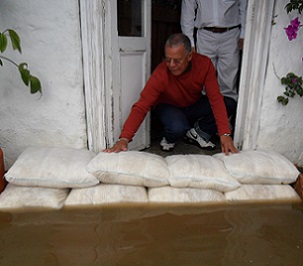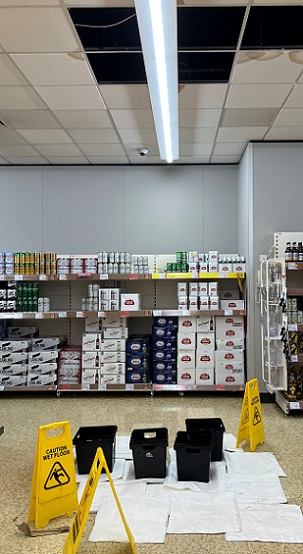
 FloodSax alternative sandbags can hold back filthy floodwater, preventing serious water damage
FloodSax alternative sandbags can hold back filthy floodwater, preventing serious water damage
 FloodSax are used worldwide to soak up leaks, spills and internal floods
FloodSax are used worldwide to soak up leaks, spills and internal floods
Vital advice missing from the Government’s new ‘preppers’ website ... and there's a big clue in the website's title Prepare
The Government’s new ‘preppers’ website has hit the headlines in a big way … but there is a vital and glaring piece of advice missing from it.
The Prepare website urges people to prepare for disasters and crisis such as floods and fire and to stock up on food and water to be prepared should the worst happen.
It talks about having an emergency kit of wind up torches and radios - along with hand sanitiser, bottled water and canned food - and there are concerns the advice will now lead to people clearing supermarket shelves.
But what it doesn’t tell people is that preventing floods is their responsibility in the first place so if they were truly prepared they would have some quick and inexpensive anti-flood measures in place.
The most flexible by far is the FloodSax alternative sandbag as each one is very thin with a large surface area so the gelling polymer inside it can be used indoors to soak up spills, leaks and internal floods.
But immerse it fully in water and the polymer absorbs the water and retains it so it becomes an instant alternative sandbag but without any sand and can be quickly and easily built into a flood barrier to keep flood water out in the first place.
Lucy Bailey from Yorkshire company Environmental Defence Systems Ltd which devised and manufactures the FloodSax said: “The Government has given advice on what to do if your property suffers a disaster such as flooding but doesn’t mention the fact that it’s every home or business owner’s responsibility to prevent flooding in the first place.
“Many people don’t realise that the local council or Environment Agency have no responsibility at all to provide sandbags or any other anti-flooding measures. FloodSax are very space saving to store and quick and easy to deploy so people who have them have the peace of mind they are prepared for flooding any time of the day or night.
“Flooding is horrendous. Floodwater is filthy and destroys everything it touches so water just a couple of inches deep in a house can cause tens of thousands of pounds damage to floors, walls, electrics, furniture and appliances. It means people often have to leave their homes for months while repairs are carried out. The average insurance payout for flood damage is now over £30,000.
“Finding trades people to do the work can also be a major challenge in itself, especially if a large area has been flooded and everyone is needing work doing, so it’s not unusual for people to be in temporary accommodation for well over a year.
“Being prepared to prevent the disaster is the message the Government needs to put out along with the importance of stocking up on vital supplies.”